Coach Mat Luebbers, Serving U.S. Military Families in Okinawa
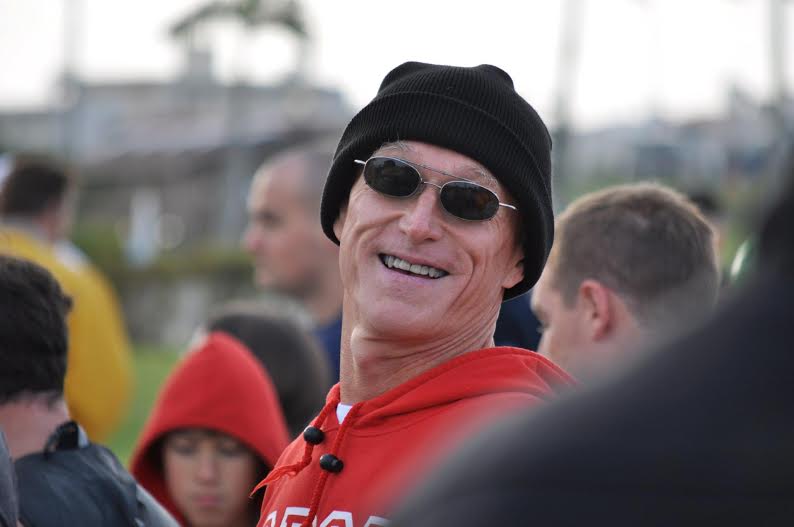
By Tera Bradham, Swimming World Intern
When you see the words swimming and Japan in the same sentence, you may expect to see the name Kosuke Kitajima, Kanako Watanabe, or Kosuke Hagino. A name you might not expect to see is Mat Luebbers. Yet swimming, Luebbers, and Japan are three words that are now irrevocably intertwined, their influences on each other irreversible. For 18 years Mathew Luebbers has made great strides in the swimming world of Okinawa, a sub-tropical island and the southernmost prefecture of Japan.
“I arrived in Okinawa in 1997, expecting to come back to the U.S. in two years. I’m still here,” Luebbers chuckles.
Luebbers is the head coach of the MCCS Semper Fit Okinawa Dolphins, a team that serves active U.S. military, civilian employees, and their families while they are overseas on Okinawa. Luebbers’ team has a youth program with varying levels of elementary, middle school, and high school swimmers, as well as an adult Master’s program.
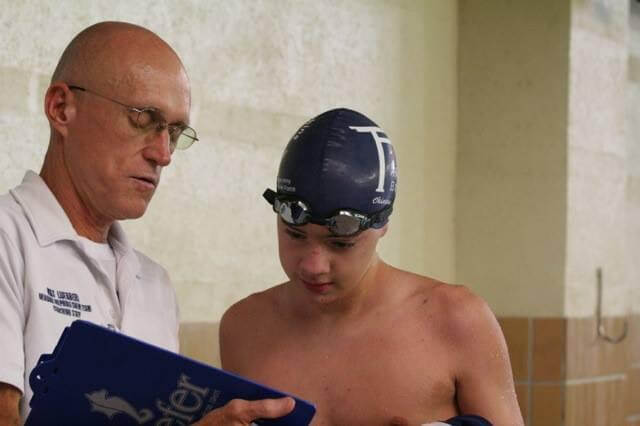
Photo Courtesy: Mat Luebbers
“Our job is to make Okinawa home for them,” Luebbers explains. “We aim to give them a place to either learn new skills, develop the ones they have, or chase their dreams.”
Due to the nature of the military, most swimmers only stay with the team for two to three years before they have to move. Luebbers may only get to see a snapshot of each swimmer’s life while he or she is on his team, but his goal is to make that chapter of the swimmer’s life a pivotal one.
“Coaching makes me happy. I enjoy coaching, and it is my identity. Coaching the folks I do here makes it even more rewarding. The military family is strong, but it is also fragile in that it is always at risk. Being able to do something that might help the strength side of that equation makes me happy,” Luebbers asserts, a tangible sense of purpose in his eyes.
“Before I got here, I thought of the military as another group of people. I still do, but there is a lot more to them than that. They are doing things for me, for us, and for our country that can mean, among many other things, that they might never come home. I see firsthand the sacrifices being made by families, and I am honored to be a part of an organization that is trying to help them get through the challenges,” Luebbers expounds.
With one or both parents working and often with one parent deployed, the challenges for the families of the Okinawa Swim Team are never lacking. Swimmers for Luebbers’ team generally arrive at the pool by bus from their schools, they put in the work at practice, and then their relatives and friends show up to watch the fruit of their efforts at competitions. Accustomed to serving, the families don’t hold back when they’re off duty.
“The number of volunteer Marines and Sailors we have at swim meets, with their spirit and willingness to serve, makes events here a lot of fun to manage. We get 40 to 100 Marines showing up at 5:00 a.m. to set up, help staff, and tear down an event. They are awesome,” Luebbers says with gratitude.
Even though the Dolphins stem from the most patriotic of families, they are by no means isolationists. They are grateful for the unique culture in which they live.
“We look for ways to interact with our host nation. The team does this through taking part in swim meets hosted by Japanese teams and by inviting Japanese teams to our meets. The swim team program hosts eight meets, three youth triathlons, three aquathlons (run-swim-run), a 2-hour swim, and a youth triathlon camp annually.”
Luebbers emphasizes freestyle and IM with his team because no matter where the next duty station or assignment takes a swimmer’s family, he wants every swimmer to be able to jump in and continue competing well. While some people might find it hard to adapt to new coaching techniques, for those connected to our servicemen and women, adaptation is a lifestyle.
“They are very strong families,” Luebbers affirms. “They are supportive within and outside of the family. Service members support other service members. It is much easier and makes life better when each person recognizes that others are in the same situation, and all can help each other stay strong, resilient and successful with their lives.”
Swimming is a sport as adaptable as it is life giving, and the Okinawa Dolphins Swim Team is just one glimpse into the opportunities this sport provides. Swimming is about learning to be a competitor and learning to be a teammate, but it is more than that. It is about learning to be a family and serving those around you.
“The military community is an amazing one. I know that there are other families and individuals that are as strong as the ones here, but I am reminded, almost daily, of the depth of the character and the power of the individual and of the family to help others be more than they can be on their own.”
With a team dynamic that could seem somewhat volatile to an American coach, Luebbers makes sure he keeps the fun in coaching and swimming.
“I try to look for something good in every swimmer at every practice. I do see what needs to change, and we work with that, but looking for the good stuff as well keeps my head in the right place,” Luebbers says of his coaching philosophy.
“I also try to do something odd or abnormal from time-to-time, like reading snippets of a story to the swimmers during their set breaks or asking trivia questions – things that take their brains off of what they are doing for a short while,” he continues. “Doing this makes the swimmers think and process, as they have to alter their focus from swimming to a diversion and then back to swimming.”
Positivity on a team stems from its leaders, and it is not difficult to see why the swimmers see Luebbers’ team as a refuge. When asked what he thinks Americans could learn from the Okinawa Dolphins, Luebbers thinks for a moment.
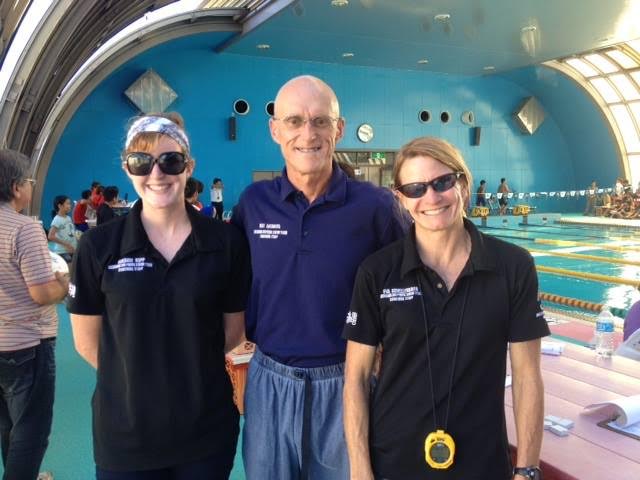
“We [Americans] need to slow down,” he responds. “We need to take some time to enjoy and learn from the journey. Don’t be in a rush to get to the destination. What are you going to do when you get there? Just start traveling again. If you do not enjoy the path, the trip of life is not enjoyable.”
Luebbers’ words are a reminder to take a moment to get off the Internet, go thank your coach, thank a veteran, and then go work your tail off to make the most of the opportunities you’ve been given. But while you’re reaching for those goals, make sure you enjoy the journey along the way.




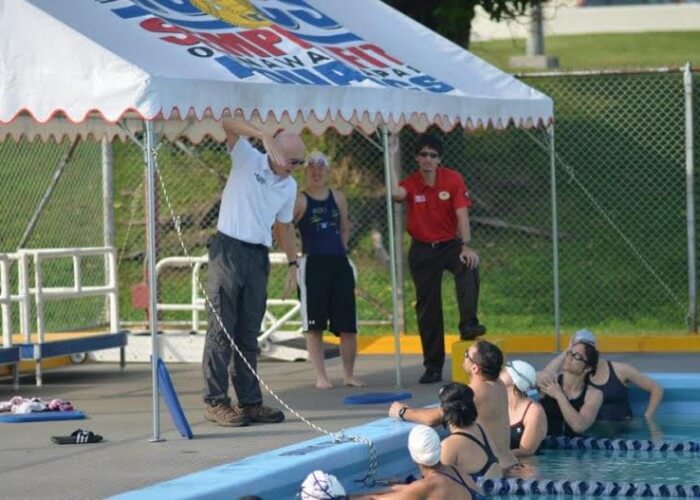
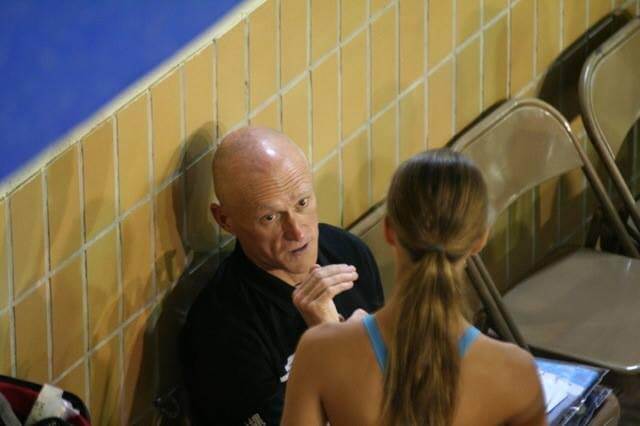
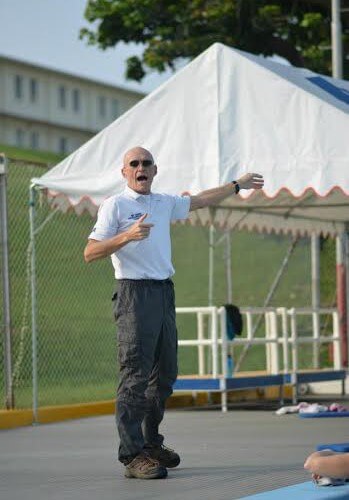
What a great article! Mat was my assistant coach when I was swimming at Lake Forest College, and I learned back then what a fantastic coach and mentor he was. So glad he is still coaching and impacting lives through the sport of swimming!
My three daughters swam for Mat while he was the head coach of the Appleton Y Marlins. They enjoyed swimming for him and we are delighted to hear he is still coaching. He was a fantastic coach then and sounds like he is still a fantastic coach. Thanks for a wonderful article on Mat.
I swim with coach Mat and Eva in Okinawa with the masters group. They are the reason why I keep getting up at 4:30am to get to the pool.
Great article coach Mat Luebbers.
Great article coach Mat Luebbers.